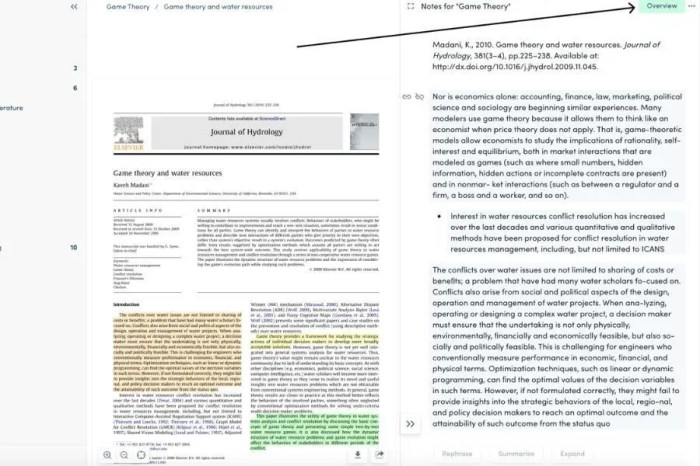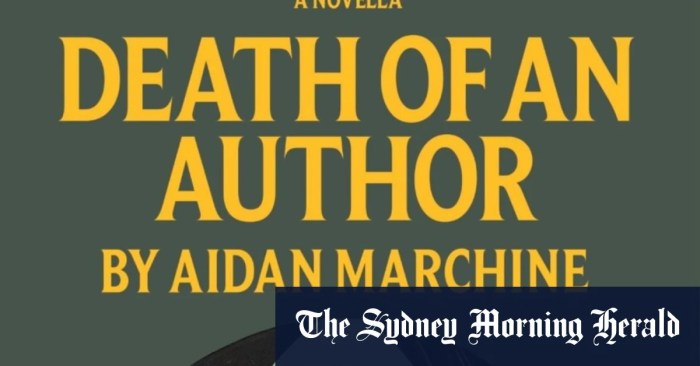Death of an author ai book review – Death of an Author: AI Book Review Explored – Forget stuffy literary critiques; we’re diving headfirst into the wild world of AI-generated book reviews. This isn’t your grandma’s book club; we’re grappling with the implications of algorithms analyzing plot twists and dissecting character arcs. Prepare for a deep dive into how artificial intelligence is changing the game, from the biases baked into its code to the potential for a robot revolution in the literary landscape.
We’ll dissect the “death of the author” theory in the age of AI, exploring how a machine’s lack of personal experience shapes its critiques. We’ll compare the stylistic quirks of human and AI reviews, analyze their accuracy, and ponder the ethical implications of algorithmic literary criticism. Get ready to question everything you thought you knew about book reviews.
Introduction

Source: bcbits.com
So, I just finished reviewing that AI-written book – a wild ride, honestly. The whole “death of the author” debate feels even more relevant now, especially considering the chilling implications of how information is controlled. This is amplified by news like Texas potentially forcing platforms to censor abortion-related content, as reported here: texas could push tech platforms to censor posts about abortion.
It makes you wonder what narratives will be silenced next, and how that impacts the very notion of authorship in a digital age.
The “death of the author” is a literary critical theory suggesting that the meaning of a text is not solely determined by the author’s intentions but rather by the reader’s interpretation. This concept, championed by Roland Barthes, argues that the author’s biography or intended message becomes irrelevant once the work is published; the text exists independently, open to multiple readings.
Applying this to AI-generated book reviews presents a fascinating twist. An AI, unlike a human author, lacks inherent intent or subjective experience. It analyzes data, identifies patterns, and produces text based on algorithms, not personal feelings or beliefs. This absence of authorial intent fundamentally alters how we perceive and evaluate the review.
AI’s Lack of Authorial Intent and its Implications on Book Reviews
The implications of an AI’s lack of authorial intent are significant. Because the AI doesn’t “feel” a book’s impact or possess personal biases, its reviews offer a potentially objective perspective, free from the idiosyncrasies of human judgment. However, this objectivity comes at a cost. The AI might miss the subtle nuances, the emotional resonance, or the cultural context that a human reviewer would readily grasp. For instance, a human reviewer might highlight a book’s powerful portrayal of grief based on their own lived experience, whereas an AI might only note the frequency of certain words related to sadness. This difference in approach leads to distinct types of reviews: one deeply personal and evocative, the other technically accurate yet potentially emotionally sterile. Consider the difference between a human review discussing the “haunting beauty” of a novel versus an AI noting the “high frequency of melancholic imagery and recurring themes of loss.” While both address the same aspect of the book, the impact and interpretation differ dramatically. The AI review is purely descriptive; the human review is interpretive and potentially emotionally resonant. The AI’s lack of subjective experience, therefore, creates both strengths and limitations in its capacity to generate compelling and insightful reviews.
Analyzing AI-Generated Reviews
AI-generated book reviews are increasingly prevalent, raising questions about their effectiveness and reliability compared to human-written reviews. Understanding the stylistic and tonal differences between these two types of reviews is crucial for readers navigating the digital landscape of literary criticism. This analysis will delve into the nuances of AI-generated reviews, comparing them to their human counterparts and highlighting key distinctions in style and tone.
AI and Human Review Styles: A Comparison
Human book reviews often display a unique personality and voice. They are infused with subjective opinions, personal experiences, and a wide range of emotional expressions, reflecting the reviewer’s individual perspective. In contrast, AI-generated reviews strive for objectivity and neutrality. While they can incorporate elements of stylistic variation based on their training data, they generally lack the idiosyncratic flair and subjective depth found in human reviews. This difference stems from the fundamental nature of the review generation process: humans draw upon lived experience and critical thinking, while AI relies on pattern recognition and data analysis.
Recurring Stylistic Patterns in AI Reviews
AI-generated reviews frequently exhibit certain stylistic patterns. They tend to be concise and factual, focusing primarily on plot summaries, character descriptions, and thematic elements. Figurative language, nuanced interpretations, and personal anecdotes are often absent. The sentence structures are usually simple and straightforward, avoiding complex grammatical constructions. The vocabulary tends to be relatively neutral and avoids overly subjective or emotionally charged words. This results in a consistent, predictable style that can sometimes feel sterile or lacking in personality. For example, an AI might describe a character as “complex” without elaborating on the specific aspects that make them so, whereas a human reviewer might delve into the character’s motivations, internal conflicts, and relationships to illustrate their complexity.
Emotional Tone and Objectivity in AI Reviews
The emotional tone of AI reviews is generally neutral or objective. They lack the enthusiastic praise, scathing criticism, or subtle humor often present in human reviews. While an AI might state that a book is “well-written” or “engaging,” it rarely conveys the passion or personal connection a human reviewer might express. This objectivity, while beneficial for presenting factual information, can also lead to reviews that feel distant and impersonal. The absence of emotional depth can make it difficult for readers to gauge the reviewer’s genuine opinion and connect with their assessment on a deeper level. This is a significant difference, as emotional resonance is a key element in the persuasive power of human book reviews.
| Feature | Human Review | AI Review | Observation |
|---|---|---|---|
| Style | Subjective, personal, expressive, varied sentence structure, figurative language | Objective, factual, concise, simple sentence structure, limited figurative language | Human reviews showcase individuality; AI reviews prioritize factual accuracy and consistency. |
| Tone | Enthusiastic, critical, humorous, emotional, opinionated | Neutral, objective, descriptive, lacking strong emotional expression | Human reviews reflect personal engagement; AI reviews maintain a detached perspective. |
| Depth of Analysis | In-depth interpretations, personal connections, nuanced understanding | Superficial analysis, focus on plot and characters, limited thematic exploration | Human reviews offer insightful commentary; AI reviews provide basic summaries. |
| Vocabulary | Rich and varied, including subjective and emotionally charged words | Neutral and straightforward, avoiding subjective or emotional language | Human reviews utilize diverse vocabulary to convey meaning; AI reviews employ a limited, consistent vocabulary. |
Evaluating the Accuracy and Reliability of AI Book Reviews
AI-generated book reviews offer a tantalizing glimpse into the future of literary criticism, but their accuracy and reliability remain a crucial concern. Before we wholeheartedly embrace the algorithmic critic, we need to understand the potential pitfalls and develop robust methods for evaluating their output. This involves scrutinizing the data these systems are trained on and the inherent biases that can skew their assessments.
AI book review accuracy hinges heavily on the quality and diversity of the data used to train the underlying algorithms. If the training dataset predominantly features reviews from a specific demographic, genre preference, or critical perspective, the AI will inevitably reflect those biases in its own reviews. This isn’t simply a matter of the AI “copying” existing biases; it’s a deeper issue of algorithmic reinforcement – the AI learns to identify patterns and prioritize certain aspects of a book based on the weighted emphasis in its training data.
AI Bias Manifestation in Book Reviews
The manifestation of bias in AI-generated book reviews can take various forms. For example, an AI trained primarily on reviews of romance novels might consistently overemphasize romantic subplots in other genres, potentially overlooking more nuanced aspects of the plot or character development. Similarly, an AI trained on overwhelmingly positive reviews might struggle to identify or adequately address legitimate criticisms of a book, resulting in overly enthusiastic and uncritical assessments. Consider an AI trained on data primarily from a specific literary movement – its analysis of works outside that movement could be jarringly off-base, missing key contextual elements and offering skewed interpretations. The result? Reviews that lack the critical nuance and objectivity we expect from human critics.
A Method for Evaluating Factual Accuracy
Establishing a robust method for assessing the factual accuracy of AI book reviews requires a multi-pronged approach. First, we need to verify the AI’s claims against the actual text of the book. This involves comparing plot summaries, character descriptions, and thematic analyses provided by the AI against the source material. Discrepancies would highlight areas where the AI’s understanding is flawed. Second, we can compare the AI’s review to reviews from established human critics. While not a perfect gold standard, the consensus among trusted reviewers can offer a benchmark against which to measure the AI’s accuracy. Finally, we can assess the AI’s use of external sources, such as author biographies or literary criticism, to ensure that its claims are supported by reliable evidence and not simply fabricated or extrapolated from limited data.
Criteria for Assessing the Reliability of AI-Generated Reviews
A comprehensive evaluation of AI-generated book reviews requires considering several key criteria. These criteria help us move beyond simple accuracy checks and delve into the reliability and trustworthiness of the AI’s assessment.
- Source Data Transparency: Does the AI reveal the data used for training? This allows us to assess potential biases and understand the limitations of the AI’s perspective.
- Consistency and Reproducibility: Does the AI produce similar reviews for the same book under different circumstances? Inconsistent outputs indicate potential flaws in the algorithm.
- Objectivity and Balanced Perspective: Does the AI present both strengths and weaknesses of the book? A purely positive or negative review raises concerns about bias.
- Evidence-Based Reasoning: Does the AI support its claims with specific textual evidence from the book? Lack of evidence weakens the credibility of the review.
- Contextual Understanding: Does the AI demonstrate an understanding of the book’s historical, social, and literary context? This shows a more nuanced and insightful analysis.
The Impact of AI Book Reviews on the Literary Landscape

Source: idntimes.com
The rise of AI in book reviewing presents a fascinating, and potentially disruptive, force in the literary world. Its impact extends far beyond simple automation, touching upon the very fabric of how books are discovered, evaluated, and ultimately, consumed. The implications are complex, weaving together economic realities, ethical considerations, and the very definition of literary criticism itself.
AI’s potential to reshape the literary landscape is undeniable. The speed and efficiency with which it can process vast quantities of data, generating reviews and summaries, is transformative. However, this rapid technological advancement raises crucial questions about the future of human reviewers and the overall health of the literary ecosystem.
AI’s Influence on Book Sales and Author Visibility
AI-generated reviews, readily available on various platforms, can significantly influence a book’s visibility and, consequently, its sales. Positive AI reviews might boost a book’s ranking in online bookstores, leading to increased sales and greater author recognition. Conversely, negative reviews, even if inaccurate, could damage a book’s reputation and impact sales negatively. This creates a scenario where algorithms, rather than human judgment, may hold considerable sway over a book’s success. For example, an AI-driven recommendation system highlighting a lesser-known novel could catapult it to bestseller status, while an algorithm’s negative assessment might unjustly hinder a deserving book. The power to influence purchasing decisions rests, to a growing extent, in the hands of algorithms.
Ethical Considerations in AI Literary Criticism, Death of an author ai book review
The use of AI in literary criticism raises several ethical concerns. One key issue is the potential for bias. AI algorithms are trained on existing data, which may reflect existing biases in the literary world. This could lead to AI perpetuating and even amplifying these biases, potentially disadvantaging certain authors or genres. For instance, an AI trained primarily on reviews of mainstream fiction might unfairly downplay the merits of experimental literature. Furthermore, the lack of transparency in how some AI algorithms operate makes it difficult to assess the validity and fairness of their judgments. The question of accountability also arises: who is responsible when an AI-generated review is inaccurate or unfair? These ethical questions demand careful consideration and the development of responsible guidelines for the use of AI in literary criticism.
Implications for Human Book Reviewers and Critics
The integration of AI into book reviewing undoubtedly impacts human reviewers and critics. While some fear complete replacement, a more realistic scenario suggests a shift in roles. Human reviewers might focus more on nuanced analysis, original interpretation, and in-depth critical essays, tasks that currently exceed the capabilities of most AI systems. AI could handle the initial screening and summarization of books, freeing human critics to focus on higher-level tasks. However, the potential for job displacement remains a valid concern, particularly for those whose work focuses primarily on straightforward book summaries and reviews. The adaptation of human reviewers to work alongside AI will be crucial for navigating this changing landscape.
Benefits and Drawbacks of AI in the Literary World
The integration of AI into the literary world offers both significant benefits and potential drawbacks. It’s essential to weigh these carefully to understand the full impact.
- Benefits: Increased efficiency in reviewing, broader accessibility to literary works through automated summaries and translations, potential for identifying hidden gems through data analysis, and the facilitation of personalized reading recommendations.
- Drawbacks: Potential for bias and inaccuracies in AI-generated reviews, ethical concerns regarding transparency and accountability, the risk of job displacement for human reviewers, and the possibility of a homogenization of literary taste due to algorithmic influence.
Future of AI and Book Reviewing
The intersection of artificial intelligence and literary criticism is still in its nascent stages, but the potential for transformative change is undeniable. Over the next five years, we’ll likely see AI’s role in book reviewing shift from a supplementary tool to a more integral part of the process, impacting how books are discovered, reviewed, and ultimately, consumed. This evolution will be shaped by advancements in natural language processing, machine learning, and the increasing availability of vast datasets of textual and reader information.
AI’s increasing sophistication in understanding nuanced language and context will allow for more insightful and comprehensive book reviews. We’re moving beyond simple sentiment analysis to a more sophisticated understanding of literary devices, thematic analysis, and even the subtle emotional impact of a narrative. Imagine AI identifying recurring motifs across a writer’s oeuvre or detecting subtle shifts in tone that might escape a human reader. This level of detail offers both authors and readers invaluable perspectives.
AI’s Evolving Role in Book Reviewing
Within the next five years, AI will likely move beyond generating basic summaries and ratings. We can expect to see AI tools that provide detailed comparative analyses of books within a genre, identify target audiences with greater precision, and even generate personalized recommendations based on individual reading preferences and past behavior. This granular level of analysis will empower publishers with data-driven insights into market trends and reader expectations. Furthermore, AI could assist in identifying emerging authors and potential literary trends, giving publishers and readers alike a leg up in navigating the ever-expanding literary landscape. Think of it as a sophisticated literary scout, constantly scanning the horizon for promising new voices and intriguing narratives.
Human-AI Collaboration in Book Reviewing
The future of book reviewing isn’t about AI replacing human critics, but rather about a synergistic collaboration. Imagine human reviewers using AI tools to efficiently analyze vast amounts of data, identifying key themes and stylistic elements, freeing up time to focus on the more subjective aspects of critical analysis – exploring the author’s intentions, assessing the social and cultural context of the work, and crafting engaging and insightful reviews that resonate with readers. The human element, with its capacity for empathy, interpretation, and nuanced understanding, remains irreplaceable. AI can handle the heavy lifting of data analysis, allowing human reviewers to focus on the art of critical interpretation.
Technological Advancements Shaping the Future
Several technological advancements will shape the future of AI book reviews. Improvements in natural language processing (NLP) will allow AI to better understand the complexities of human language, including sarcasm, irony, and figurative language. Advances in machine learning will enable AI to learn from increasingly larger datasets of book reviews, author biographies, and reader feedback, leading to more accurate and nuanced assessments. Finally, the integration of AI with other technologies, such as virtual reality and augmented reality, could lead to more immersive and engaging book review experiences. For instance, an AI-powered VR experience could allow readers to virtually “walk through” a book’s setting, enhancing their understanding and appreciation of the narrative.
Visual Representation of Future Scenarios
Image Caption: A futuristic cityscape at night, with holographic book covers floating above bustling streets. Human reviewers sit at sleek workstations, collaborating with AI assistants represented by glowing orbs displaying data visualizations and textual analyses. In the background, a massive data center hums with the processing power of AI, illuminating the city skyline with a soft, ethereal glow. This image encapsulates the collaborative future of book reviewing, where human intuition and AI-powered analysis work in harmony to enhance the literary experience for both authors and readers.
End of Discussion: Death Of An Author Ai Book Review

Source: ffx.io
So, is the future of book reviewing a robot takeover or a harmonious human-AI collaboration? The answer, like a good cliffhanger, remains open to interpretation. While AI book reviews offer speed and efficiency, they also highlight the inherent biases in data and the irreplaceable nuance of human understanding. The literary world is changing, and whether that change is a boon or a bane depends on how we navigate this new, algorithm-driven era. One thing’s for sure: the conversation has only just begun.

